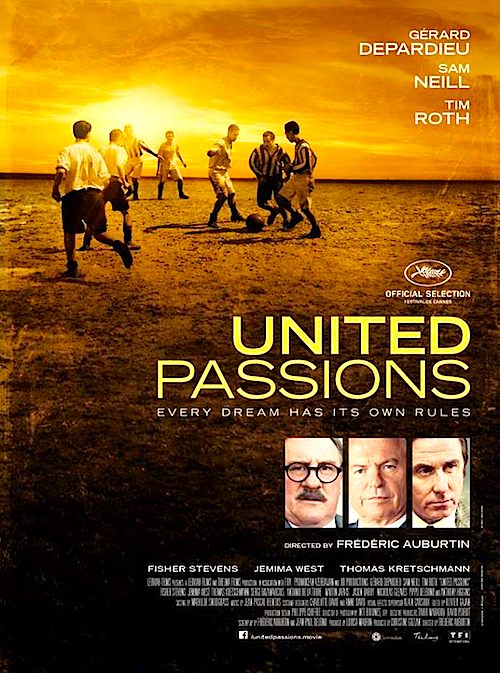By Joe Bendel. Last year’s Cannes Film Festival was rough for Tim Roth. First Grace of Monaco was roundly booed when it opened the festival and then FIFA’s self-funded film was even more harshly received. The timing for what has been universally described as a “propaganda film” continues to be so awkwardly bad, you have to wonder if a higher power is out to sabotage it. Mere days after fourteen high-ranking FIFA officials were indicted, Frédéric Auburtin’s United Passions opens this Friday in New York.
It all started innocently enough. A group of European football association presidents joined forces, in hopes of codifying standardized rules for international matches. Much to their regret, the mean old English initially refused to join out of elitist snobbery, or so Auburtin suggests. At least for a few years, it was run without controversy by first president Robert Guérin and general secretary Carl Hirschmann, but the fast and loose dealings commenced with the election of Jules Rimet. Uruguay had pledged to spend liberally on the inaugural World Cup, and ever so conveniently the member associations voted accordingly.
To an extent, United Passions (a title that sounds like it was the ill-conceived product of a marketing brainstorming session) throws long time FIFA president João Havelange under the bus. He is constantly apologizing to his long suffering general secretary Sepp Blatter for mistakes that were made and the mysterious emptiness of FIFA’s coffers, but the film never explains what’s, why’s, or how’s. Instead, the altruistic Blatter simply cuts a personal check to cover FIFA’s payroll.
 There is a certain degree of irony whenever Russia’s favorite son, Gérard Depardieu appears in a sports film, but that is the least of Passions’ problems. In fact, he is perfectly presentable as the reportedly not so athletic Rimet. On the other hand, Sam Neill would probably prefer to forget the baffling, vaguely South African accent he uncorks for the Brazilian Havelange. Looking visibly embarrassed, poor Tim Roth tries to call as little attention to himself as possible as Blatter, the unassuming crusader against corruption. At one point, St. Sepp (who Havelange praises for “being good at finding money”) stands accused of his predecessor’s misdeeds, but defends himself with what must be the dullest, drabbest climatic speech in the history of cinema. It doesn’t matter, the fix was in.
There is a certain degree of irony whenever Russia’s favorite son, Gérard Depardieu appears in a sports film, but that is the least of Passions’ problems. In fact, he is perfectly presentable as the reportedly not so athletic Rimet. On the other hand, Sam Neill would probably prefer to forget the baffling, vaguely South African accent he uncorks for the Brazilian Havelange. Looking visibly embarrassed, poor Tim Roth tries to call as little attention to himself as possible as Blatter, the unassuming crusader against corruption. At one point, St. Sepp (who Havelange praises for “being good at finding money”) stands accused of his predecessor’s misdeeds, but defends himself with what must be the dullest, drabbest climatic speech in the history of cinema. It doesn’t matter, the fix was in.
Passions commits enormous sins of omission, but its worst oversight is the lack of dramatic development. We see little more than vignettes illustrating “great” moments in FIFA history, interspersed with World Cup montages and hackneyed scenes of a pick-up game in some racially balanced third world slum designed to clumsily illustrate the game’s unifying global significance. However, there is not a lot in terms of character or plot for viewers to sink their teeth into. Instead, we hear Blatter identify a problem, which he then presumably solves since we hear nothing about it four years later.
As if the weak narrative and conspicuous white-washing of FIFA’s corruption were not bad enough, the film displays an outrageous bias against the English, time and again featuring British characters making ridiculously racist statements. This simply is not a film that deserves to be taken seriously on any level. However, it is precisely the big screen treatment Blatter and FIFA deserve. Hopefully, they are happy with it, since they paid for it.
Indeed, this is truly a Blatter production. It is a staggeringly arrogant, insular, and tone-deaf work that assumes the rest of the world is stupid. Compared to Passions, See You in Montevideo and Montevideo—Taste of a Dream, the unapologetically sentimental, patriotic, and generally pleasant Serbian films about the first Yugoslavian World Cup teams are like the best of Rocky, Bull Durham, and Chariots of Fire all rolled together. Not recommended, United Passions opens this Friday (6/5) in New York, at the Cinema Village.
LFM GRADE: F
Posted on June 2nd, 2015 at 1:05pm.